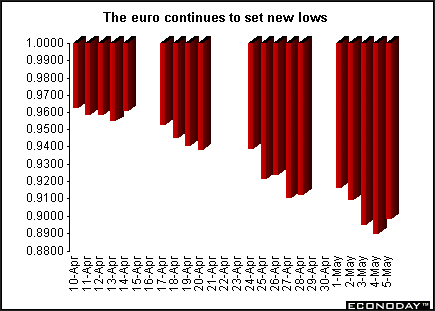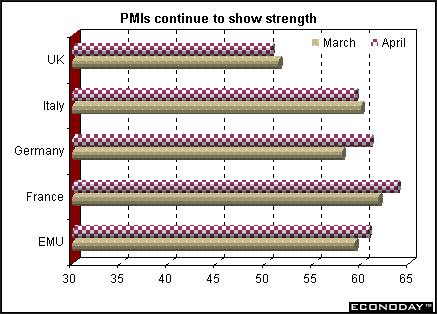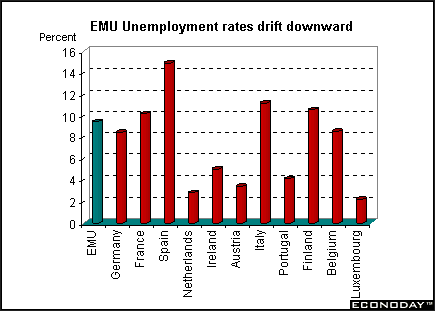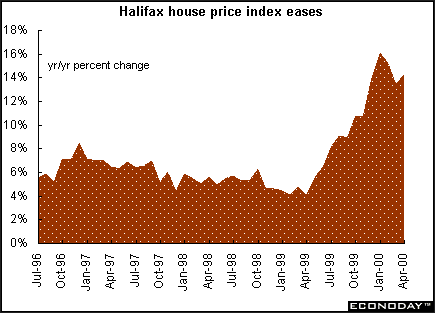| Previous Articles |
|
Exchange merger to spur
investment Equity trading continues
to be haunted by the specter of higher interest rates. The U.S. employment
report lived up to expectations with strong job gains and still lower
unemployment. But the U.S. equity markets confounded analysts by rising
rather than falling on the strong report. The explanation was that the
market had already factored in the possibility of a 50 basis point Federal
Reserve interest rate increase on May 16th.
Britain and Europe - Equity markets gyrated in the holiday shortened week as interest rate worries addled the London FTSE in the run up to the Bank of England's monetary policy committee's interest rate decision. Analysts had been split as whether interest rates would be raised, particularly in the light of soft gross domestic product data and weakening manufacturing. And there was some nervousness among banks ahead of the meeting, particularly those with heavy exposure to the mortgage market.
The FTSE 100 had other domestic concerns, with the strength of sterling - or as some put it - the euro's weakness, the most potent worry. And although the London Stock Exchange may be planning a merger with its Frankfurt counterpart, traders continued to look to Wall Street rather than Europe for direction. In the end, the Bank of England left interest rates where they were (at 6 percent) and the pound sterling sank against the dollar as a result. The FTSE 100 index ended the week down 88.6 points or 1.4 percent at 6238.8. The Paris CAC set a new high on Tuesday as European markets returned from their three day weekend. And the markets ended on a firm note Friday in spite of another uneasy session for bond and currency markets. On the week, the CAC closed up 126 points or 1.96 percent, just below its new high at 6545.76. Frankfurt DAX comfortably absorbed profit taking, a faltering Nasdaq and fresh new lows for the euro. The latter pushed interest rate concerns back to the top of investors' agenda. The index traded narrowly in subdued volumes as investors tracked developments in the currency and bond markets. It made for another nervous week. At week's end, the DAX had gained 116.14 points or 1.57 percent to stand at 7530.82 Asia - With only Monday and Tuesday to trade, Japanese markets had to make the most of the holiday shortened trading week. Japanese equities rebounded thanks to Nasdaq gains on the previous Friday. After a lackluster Tuesday, the Nikkei ended up 466 points or 2.59 percent at 18,439. In other Asian markets, the Hong Kong Hang Seng reacted nervously to the Nasdaq's ups and downs. With the Hong Kong dollar pegged to the U.S. dollar, the Hong Kong markets are extremely sensitive to anything that may impact U.S. interest rates - and therefore by definition - those in Hong Kong as well. Analysts are concerned that the Hong Kong economy has not yet recovered enough from the Asian crisis to withstand higher interest rates. On the week, the Hang Seng sank 250.66 points or 1.62 percent to end at 15,269. The Australian all ordinaries had its own interest rate worries as the Reserve Bank of Australia did what was expected and raised its key policy making interest rate by 25 basis points to 6 percent. Analysts expect the central bank to boost rates by at least another 25 basis points soon. The Australian markets are extremely sensitive to interest rate spreads with the United States. However, despite market declines in reaction to the interest rate increase, the index managed to recoup most of its loss Friday and close down only 9.5 points or 0.31 percent on the week at 3076. Americas- The Toronto Stock Exchange Composite 300 index is the best performing index of the 12 tracked here. Since the beginning of the year the TSE is up over 14 percent. In comparison, the Dow is down 8 percent, the Nasdaq down 6.2 percent and FTSE 100 down 10 percent. Besides the TSE, only the Paris CAC (up 9.9 percent) and the Frankfurt DAX (up 8.23 percent) are in positive territory so far this year.
London
and Frankfurt to merge The merged exchange will control 53 percent of Europe's trading volume. That will increase substantially when the stock exchanges in both Milan and Madrid join the group, as they have indicated they will do as soon as possible. All share prices will be quoted in euros, except in London where British-based companies will have the option of having their shares listed in pounds. BOTTOM
LINE This development is also important for Europe in the macroeconomic sense as well. It means that, finally, European companies will have the same array of possibilities for financing growth that American companies have had. Taken together, this will means that European companies, old and young, should be able to raise capital as never before. Currencies
The euro rose Friday on speculation that the European Central Bank will move to support its slumping currency. This was after ECB president Wim Duisenberg made an unprecedented statement supporting the euro, and ECB vice president Christian Noyer said intervention is, ``a tool in our hand. We may use it when we deem it appropriate.'' The rhetoric is bound to pick up on Monday when the Ecofin ministers meet. Ecofin (short for economic and finance) is part of the European Union and consists of the 15 member countries' economic and financial ministers. The ministers have become increasingly disenchanted with the euro's continuing loss of value. The heightened expectations of action could have an impact on the currency if strong support is not forthcoming from the ministers. Central
bank briefs The Reserve Bank of Australia raised its key policy making interest rate by 25 basis points to 6 percent. It was the fourth increase in six months as the Bank attempts to prevent higher wages and growing import costs from forcing up prices. Indicator
scoreboard
Other
Indicators
Fourth quarter gross domestic product rose an unrevised 0.9 percent on the quarter. When compared with last year the growth rate was revised up slightly to 3.1 percent from the 3.0 percent gain previously reported. For all of 1999, GDP grew 2.3 percent. The March unemployment rate eased to 9.4 percent from 9.5 percent in February. Unemployment rose only in Finland, to 10.6 percent from 10.5 percent, was flat in Germany at 8.4 percent and in Luxembourg at 2.2 percent, but fell to 10.2 percent in France and to 14.9 in Spain.
April Reuters seasonally adjusted services activity index rose to a new record high of 62.5, indicating that the services sector expanded at a faster pace. Prices charged also rose to the highest level since the index's start in July 1998 to stand at 54.6 vs. 53.8 in March. April European Commission's economic sentiment index was unchanged from March's all time high and reflected a further gain in industrial confidence. A national breakdown shows that overall economic sentiment rose in four of the EMU countries: France, Spain, Austria, and Ireland. Sentiment fell in all other countries, with the exception of Portugal, for which no data was available. March industrial producer prices - excluding construction - rose 0.6 percent. As in previous months, the March increase was due largely to higher oil prices. However, the oil price drop following OPEC's decision to increase production may result in lower producer prices starting in April. Germany - March seasonally and price adjusted manufacturing orders were down 0.9 percent, a sharp reversal from the 5.8 percent rise seen in February. In the first quarter manufacturing orders were up 0.8 percent when compared to the fourth quarter of 1999 and were 10.5 percent above a year ago. March west German manufacturing orders slipped 0.5 percent while east German orders fell by 5.3 percent. Italy - March seasonally adjusted business confidence rose to its highest level since the series began in January 1994, while indications of future producer price pressure eased from February. February unadjusted industrial orders rose 17.6 percent on the year, compared with an unexpected 4.6 percent dip in January. The February result was the biggest increase since March 1998. Foreign orders were up 16.1 percent on the year while domestic orders rose an annual 18.5 percent. April seasonally adjusted services index rose to a high of 64.1 from 58.7 in March, indicating that the services sector expanded at the fastest rate since the index's start in January 1998. Britain - April Nationwide house price index jumped by 1.6 percent on the month and by 17.5 percent on the year. In March, house prices increased by 2.3 percent on the month and by 16.2 percent on the year. April seasonally adjusted Halifax house price index climbed by 0.8 percent and by 14.2 percent on the year. Although the rate is up when compared with last year, Halifax said that the figures for the past few months suggested that the underlying pace of house price growth is easing.
April retail sales volume growth accelerated but still fell short of retailers' expectations, according to the Confederation of British Industry. The latest monthly CBI distributive trades' survey showed the sales volume balance rising to 33 percent in April from 23 percent in March and from 15 percent in April 1999. The underlying trend reveals steady growth, which is likely to be sustained despite retailers facing tough competition and pressure to keep prices down. April Chartered Institute of Purchasing and Supply's (CIPS) services business activity index stood at 59.5, up from 59.6 in March. This was despite evidence of rising price pressures. CIPS said the hotels and catering sector recorded the strongest growth in April, partly fuelled by a pick-up in seasonal demand. Cost and price pressures both accelerated in April. The prices charged index increased to 53.9 in April from 53.6 a month earlier while the input prices index rose to 60.4 from 60.0. Both price indices are the highest on record. Americas March industrial product price index rose 0.6 percent. Rising prices were pervasive. IPPI rose 5.5 percent when compared with a year earlier, decelerating slightly from February's growth of 5.9 percent. Once again, petroleum prices were the key to the gains. Rising prices for products related to primary metals, paper, meat and chemicals also contributed to the increase.
March raw material prices increased 2.0 percent. Again, higher crude oil prices were mainly responsible. If mineral fuels, almost all of which is crude oil, were excluded, raw material prices would have risen 0.9 percent. Manufacturers paid 33.1 percent more for raw materials when compared with last year. Crude oil prices were the major contributor, as prices more than doubled (109.7 percent) since March 1999. If mineral fuels were excluded when compared with last year, the increase in manufacturers' raw materials prices would have been 8.4 percent. This increase, excluding mineral fuels, was the largest since August 1995. April unemployment rate remained unchanged at 6.8 percent for the fifth month. Employment also remained virtually unchanged as increased part time workers offset a decrease in full time workers. BOTTOM LINE
|
|||||||||||||||||||||||||||||||||||||||||||||||||||||||||||||||||||||||||||||||||||||||||||||||||||||||||||||||||||||||||||||||||||||||||||||||||||||||||||||||||||||||||||||||||||||||||







